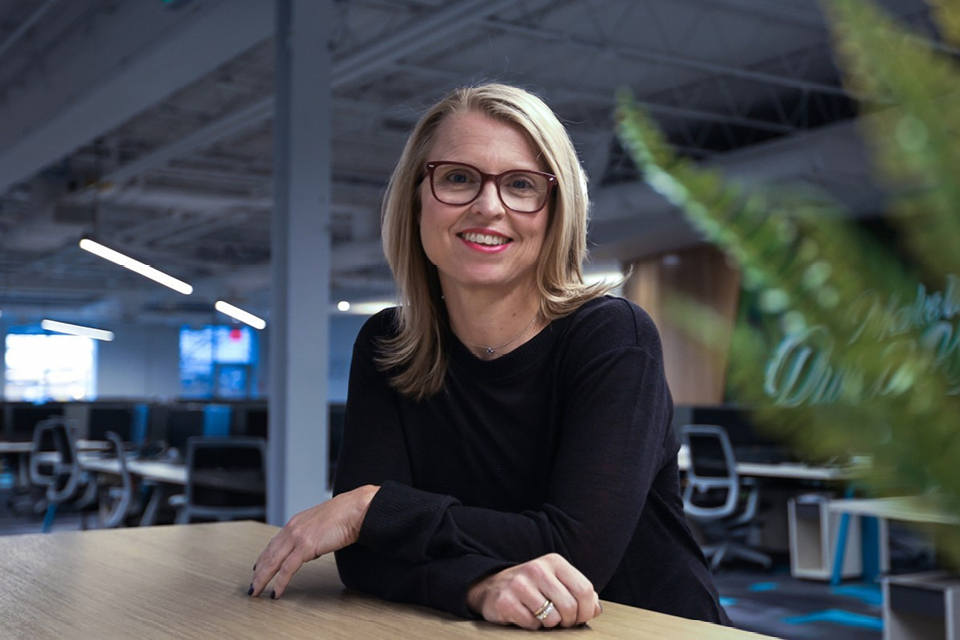Breaking career-growth stereotypes
Peter B. Gustavson School of Business
- Natalie Bruckner

Keira Torkko solves business puzzles through the lens of people
Chatting with Keira Torkko (BCom ’97), you can’t help but feel inspired—empowered, even. Her unique approach to business could be likened to finally taking a camera lens cap off and letting the light stream in.
It’s an approach she has honed as a result of an unorthodox 26-year career journey and the experience she has gained working in a number of different roles during that time in the public, private and not-for-profit sectors.
“My job, as I see it, is to solve business puzzles through the lens of people. If we’re not thinking about people first and their contributions to the business, we’re not thinking about our business in the right way,” explains Torkko, chief people officer at supply chain sustainability management company Assent, where she leads the development of its team.
Since Torkko joined four years ago, Assent has grown from 300 team members to more than 900 and recently raised $360 million (USD) in venture funding. Torkko credits the company’s great people strategy for this exponential growth.
Business Class caught up with Torkko to discuss how she broke the traditional career journey mould, how understanding the importance of personal branding yielded results for her and what it means to tackle business puzzles through the lens of people.
Unique career path
BUSINESS CLASS: When it comes to what we consider to be the traditional career path, you break that mould. Where do we tend to go wrong when we view career growth?
KEIRA TORKKO: There’s this idea that we need to follow a logical and linear path for our entire career. What many fail to capitalize on is how many skills are transferable if you are purposeful. Many times during my career, I have taken on roles or puzzles that I wasn’t sure if I was capable of solving. But I had people around me who pushed me outside my comfort zone and helped with my own growth journey—both personally and professionally.
BC: Your own career path has been somewhat unconventional and breaks many stereotypical ideas. Can you tell us how you got to where you are today?
KT: After my BCom degree at UVic in 1996, I worked in a few small companies and then entered into the financial sector with TD Bank, where I worked in both personal and commercial banking. I realized finance wasn’t my passion, but I loved working with my customers. My husband (also a UVic grad) and I moved to Ottawa and I took a job at the Ottawa Centre for Regional Innovation (OCRI) where I was able to take my business banking experience and help people start small businesses. After the tech downturn, it was time to diversify my work portfolio, and I joined the National Research Council of Canada in its new company creation and tech transfer commercialization group. I was there for 12 years and had eight different jobs, continually increasing the size of my team and leadership responsibility across a wide range of technologies.
I reached a point where I felt I had reached a ceiling and was given the opportunity to join the Coaching Association of Canada as COO. I was part of the leadership team responsible for raising the stature and influence of Canadian coaches, from youth sport to high performance across 67 national sports. I loved it there—it took me off journey and off path, and was exactly what I needed at the time. We drove performance in sport through great leadership.
For my next opportunity, I wanted to experience a different kind of personal growth and continue to have an impact. Through time spent in a previous board role, I met a colleague who put me in touch with the CEO at Assent. We hit it off right away. We spoke about the role of VP of HR. I had never done that role! But I had hired, led and managed hundreds of people over my career and it seemed like a natural transition.
Creating your personal brand
BC: Understanding the importance of creating your personal brand has been key to your success. Can you explain what personal branding means?
KT: I learned early on that a lot of people don’t know how to translate their skills, or how to apply their skillset in non-obvious ways. The first step is to drill down to identify your skills and create your brand. If your brand is being the person who goes that extra mile, or who does the most research, those are the sorts of things that people will remember you for. Those skills translate across roles.
You need to ask yourself: How do you context adapt what you have been doing to what you can do? Be true to yourself and your values, because that won’t ever change. I love that a firefighter, for example, knows how to manage things in a crisis. That skill can be applied to so many roles, like customer service issues, for example.
I realized my “brand” was my ability to focus on people, to uncover the impact I can have on the team—whether that’s a team of 10 or 300. I learned during my time at the Coaching Association of Canada how foundational leadership and people skills translate across so many different areas. The details really matter.
Reflecting back
BC: You say you were quite a shy student. How did you break out of that and become the leader you are today?
KT: It’s a funny story really. I remember a co-op advisor at UVic called Mick Collins who told me the difference he saw in me from my first co-op work term to the end of my last co-op was immense! I was shy and pushed myself to develop my confidence through the program.
One of the best things I ever did during my degree was take an elective course called Acting I (for non-theatre students). For one of my first assignments I had to stand up in front of a class of students I didn’t know and play the fool. I would vomit in the bathroom before that class! But that really pushed me out of my comfort zone.
It showed me how important it is to do things you don’t think you’re capable of. That happened throughout my career. One time I was asked to take on a large team of 300 in a domain I wasn’t that familiar with. I said no to the job three times. Finally the leader said, “You’re doing this.” They knew I was capable, even if I didn’t. It made me realize that you don’t need to be an expert in the specific technology, for example, since the team has that expertise. They needed someone who could provide them with direction, motivation and who understood the business and systems to help them be successful. I was fortunate that the person wouldn’t take no for an answer! That was powerful.
BC: How important were mentors to your career journey?
KT: For many of my roles I was fortunate to have leaders who pushed me. They saw things when I didn’t. I would never have applied for many of the roles, as I didn’t think I had the skills, but I had great champions and cheerleaders to help get me those opportunities.
If I hadn’t been given that opportunity to lead large teams outside of my comfort zone early on in my career, I wouldn’t be where I am today.
Joining Assent
BC: You describe your current role at Assent as solving business puzzles through the lens of people. Can you explain what that means and how your career experience really complements that?
KT: Before joining Assent, I had limited direct experience focusing solely on HR, or in the world of supply chain solutions. I had, however, worked in the business careers office at the university, so it was almost like coming full circle. But I come from a business background, with the lens of, “How am I supporting our people to make sure that they’re feeling engaged and aligned?” At Assent, we use the word “puzzle” rather than “problem” deliberately, because puzzles are meant to be solved. And we also call our team “Employee Experience”—to demonstrate our commitment to supporting how team members are valued at all stages of the journey.
Assent is a fast growing SaaS company, growing at 40 to 50 per cent a year. Andrew Waitman, the CEO, and I agreed that my unique background would bring a different perspective to this growth. I had led all sorts of teams, so I understood what the teams were going through, what they were experiencing and how to solve puzzles.
My portfolio at Assent has grown a lot since joining. While my focus is on people, I get involved with many aspects of the business. For six months in 2020, I led customer success and professional services. I am also co-chair of the internal corporate sustainability committee—it’s about making sure we live the values of our product and remain transparent about our own sustainability journey. Sustainability requires companies to limit actions that result in negative social or environmental impacts, while ESG takes a broader view to consider issues like stakeholder diversity, treatment of workers, community engagement and health and safety. We support the supply chain in product compliance but also in human rights practices, anti bribery, anti corruption and child labour. For us it’s about creating a sustainable supply chain to manage risk through transparency—after all, people are the biggest risk in any process and supply chain.
Looking ahead
BC: What would you say drives you to continue exploring new opportunities and help others on their career growth journey?
KT: I believe we should always be reaching higher and that lifelong learning is important. While I was at OCRI, I became a Certified General Accountant (CGA—now CPA). I never wanted to practice directly as an accountant, but I wanted to have that financial knowledge. Even now, in HR, my accounting designation still provides extraordinary value. I ask questions people never expect of me and I get asked to the table to support all aspects of the business.
Coaching and mentoring others is also important to me—recognizing the potential in others and how that drives performance. I actually recently hired my first UVic business grad, Somto Odili (MGB ’21), and she is fantastic. She likely teaches me more than I teach her.
Ultimately, I want to be a great role model for my teenage boys. I want to show them that career/family/values can live in harmony and that I am supportive and supported. That, and that taking risks which may take you off a predetermined path is rewarding. Be open to the possibilities.

